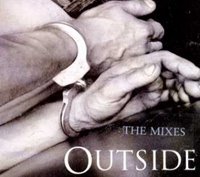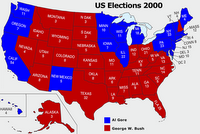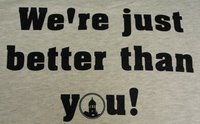
The National Holiday
The hottest weekend of the year fell on the unofficial start of the American summer season. I decamped late Friday for chez La Vickstrix in Little City, where a whole lot of nothing was planned. Departing Cold City, heading into the deep country that separates Cold City and Little City, I was struck by the essential meaninglessness of this national holiday, and perhaps all national holidays. Instead of remembering our war dead (however laudable or problematic one may find that enunciation of meaning), we rush off to enjoy barbecues and boating and shopping and whatever else the restless American pursues these days. National days of remembrance here are in fact big occasions for, like my weekend, a whole lotta nothing. It would be easy to chalk this up to the polarized political state of the nation or the “culture wars” or social decadence, but for as long as I can remember Memorial Day, as well as the long lost separate Birthday celebrations of Washington and Lincoln (shockingly and pathetically collapsed into President’s Day), not to mention Labour Day, have become unfixed, just another day to hit the mall, seemingly, in both Red and Blue America.

I have always preferred the ritual of Remembrance Day in Canada and the United Kingdom, with solemn ceremonies at cenotaphs and red poppies pinned to lapels and blouses and jackets. Perhaps this is also because Remembrance Day falls in late autumn, not exactly the time for beer bellies and Harley Davidsons and adventures at the beach. What would the emblem of the US Memorial Day be? A powerboat? An XXL SUV? A fishing pole? A bikini? A sale circular? Oh, sure, there are the occasional flags on display, and for those with memory or emotional need, time in the cemeteries, placing small flags on tombstones while SUVs cruise by on their way to the A & W. I feel that we should seek to try and instill more meaning in this occasion, at the same time recognising that the American people are the most overworked in the industrial world. Why deny any working American a day of pleasure in the grind that is our collective socio-economic life?
Spotted en route to Little City: a beat-up American car cruising in front of me, sky blue, real ugly, the shit Detroit produced in the eighties, maybe a Cutlass Ciera. Out of the driver’s side window a big, brutish, masculine arm (which belonged to an equally brutish, working class man) waving in and out of the lusciously hot air like a little boy, a small pleasure, a recognition of holiday, of summer, that brought a smile to my face.

Air Conditioning
I live in an old building, quaint and pleasant, but without three-pronged plugs, much less all the mod cons like automatic dishwashers, in-suite washers and dryers, and central air. Central Air. A/C. The pleasure of American modernity: at the touch of the dial, the discomfort of our seasons, so the bane of pre-A/C explorers and settlers (coincidently, the same people we purportedly inherit our grit and spirit from), banished outside of the double-paned aluminum window. La Vickstrix and I both grew up in desert climates, but she is positively addicted to air conditioning. Inside, the soft purr of air and a decidedly comfortable temperature. Outside, smoking a cigarette, the roar of a thousand air conditioning units blares into the night, disturbing my peace (along with dive bombing beetles and mosquitoes).
Upon returning to Cold City, I nearly collapse in my apartment due to heat stroke, it is so unbearable. As I plug in the fan and contemplate a cool shower, I fondly remember the climate control at La Vickstrix’s house and also ponder whether I can survive another sticky hot summer sweating out all the expensive French bottled water I consume.

Readings
There are fun and games with La Vicks, but it is an intellectual household, after all, so there was also time to catch up on one's reading. I brought an excellent little book on the killer snowstorm of the 1880s, The Children's Blizzard, which was a nice contrast to the ninety degree weather, and certainly made one grateful for The Weather Channel. For whatever reasons, the tale of how an unexpected winter blizzard suddenly caught the Scandinavian, German, and Eastern European pioneers of the Dakota territory unawares (especially their children, en route from the school house to home, hence the name of the storm), resulting in almost 500 deaths, is both fascinating and tragic. The reading of how alien and brutal the weather was for these immigrants also made me think about how distant we are from that time, and how our cultural notions of pioneer grit are in fact wildly displaced (for due to the tragedy of the storm, a lot of these immigrants didn't stay to stick it out, How the West Was Won style, but hightailed it outta there, maybe to Florida). As a culture, we have an incredible infrastructure of myth surrounding both the settlement of the West and immigration that can be compelling when they come together in critical appraisal, especially in unexpected ways. Also, Queen of the Nerds, I love this sort of disaster history, although eventually even I had to put aside the story of Krakatoa because it was just too turgid.

I also read through a relic that La Vicks had picked up randomly, Tearoom Trade, which I remember reading in college (it was in the infamous "HQ" section, next to the defaced copy of The Joy of Gay Sex). While one would think a study of homosex in public restrooms would be decidedly salacious one-handed reading, it is in fact an interesting and measured study of the social and sexual factors that would lead men into these situations. The work was controversial because the researcher, Laud Humphreys, at the time a closeted academic, used unconventional techniques to conduct his study, primarily serving as a "watchqueen" (basically voyeur/lookout), a role in the "game" of tearoom sex. The 1975 edition La Vicks had came with a compendium of essays at the back that criticised the work, including one that compared Humphreys's research methodology (secrecy, imitation, no informed consent) to Nixon (!). All I can say to that one is We've Come A Long Way, Baby! One of Humphreys's most interesting observations was that the closeted men who participated in tearoom sex were often the staunchist supporters of strict moralism outside of the tearoom in an effort to protect their desire and justify their actions, which Humphreys labelled the "Breastplate of Righteousness," the closeted version of "Me thinks the Lady Doth Protest Too Much." The more things change...
Such contrasts (blizzards, toilet sex) always appeal to me, and it is nice to toggle between the two (or three, or four) reading projects one has at any given moment. La Vicks's baroque couch was the perfect perch to do some reading into the night, especially now since due to the impending arrival of her mother, the front room has been mildly de-tchotckeified so at least there is a niche to place one's can of Diet Coke.

L’Amerique Profonde
I love visiting with La Vickstrix and her once and future ex, Ms. Clinique, but I always return from Little City both relaxed and a little freaked out. It’s not just the “Pray for an End to Abortion” signs with an image of clasped hands or the equally saccharine billboards proclaiming “I can see and say my numbers at 26 weeks” over photos of mildly adorable (in actuality horribly bloated and hideously monstrous) toddler faces lining the highway between Cold City and Little City, although that speaks to one aspect of this dislocation. It is the descent into places where cookie-cutter apartment developments line the interstate with big, yellow plastic banners that say “Apartments!” I think, who in their right mind would want to live there?
Or the florescent-hued horror of Blockbuster Video on a Saturday night, full of heterosexual energy and bluster, either in the spectre of couples mooning over each other as they cruise rows of predictable, safe, and ultimately boring genres (romantic comedy, action thriller, horror), or the fathers and mothers with innumerable chicks in tow, loading up on mindless entertainment (Killer Arab Squirrels Take Manhattan or How Dolly Stopped Worrying and Learned to Love Patriarchy? Which do you want honey?) and sweets, everyone driving away in large SUVs or hideous Vanagons with Big Gulps in the cup holders. Nor is it the smell of diesel that hangs over the harbour from boats galore, nor the tweakers and working class families having picnics in a city “park” located right next to the sewage treatment plant, the effluvia of garbage in the air. Mmmmm, Mom!
Of course, it is not that these things don’t exist in Cold City, or any other American place. But they seem so real, so tangible, in Little City. Wrapped in the cocoon of my urban neighborhood, with its vintage clothing stores, used bouquinistes, Aveda concept salons, boutique supermarkets, and alternative CD/DVD emporiums, the simultaneous recognition and dissonance of visiting Little City with its all-American pretensions leaves me feeling slightly nauseous from vertigo, reassured but slightly disoriented, wondering what my place is in this tale of two national d(io)ramas: the urbane decadent and the suburban mainstream (overlapping and interwoven, of course, but humour me here). The alterity of the experience makes me feel grateful for Cold City, certainly not one of the great American cities of legend but recognisably a city, for whatever that’s worth.

Sometimes the contact zones between these two Americas, not necessarily Red and Blue, more like Dockers versus Palazzo Pants, Kraft Dinner versus Mango chutney reduction, SUV versus tram, Safeway versus Whole Foods, can be intriguing, in a sort of anthropological way. There is a mall on the edge of Cold City (a contact zone; a borderlands?) that I go to often, to do the department stores and visit Crabtree and Evelyn. The dynamism can be interesting: punkettes and homos in black and yuppies and lipstick lesbians (and me, I suppose) meet suburban matrons, Amish girls in white bonnets, and 4H families in matching snowsuits. It is not like there is some sort of synthesis going on, but the space is tentatively shared. A cynic would say this sharing is predicated on shopping and consumerism, which is certainly true, but what is the effect of the punkess on the Amish girl, or vice-versa? Does one of the snowsuited teenagers dream of one day becoming the homo in black? Does the lipstick lesbian desire a Sapphic version of the suburban matron, big haired and French manicured?
Trips to Little City always bring the question of the logic of this particular equation to the forefront of my mind, although the line pervades my immediate spaces as well.

Snobbery
Of course, some (maybe all) of these thoughts on the division between Dockers America and the Palazzo Pants archipelago can also be chalked up to class differences. The Right loves to portray the Left generally but academics in particular as stuffed shirted swells, eating their French delicacies in towers of sin looming over cities full of racial pollution and sexual hedonism, while true America works hard and plays hard, in a sort of heteronormative, wholesome way (they obviously haven’t been online recently, where the inchoate and positively kinky desires of [Red] America are vividly on display). This reminds me of the relationship, pre-Revolution Tranquille, of the Québec church to Montréal: here, in Chicoutimi, your souls are safe, while in Montréal, with girls and sin and music and lipstick, they’re all going to hell on a one-way ticket, a memory I read somewhere. It also reminds me a bit of a plaque Mr. Gordo brought back from Venezuela, which we hung in a campy way in our loo (the only appropriate place) at our old house, of an image of the entry into Heaven. The queue divides halfway through the image, with nuns and "crippled" children and popes going north to Heaven and dancers, urban sophisticates, and tribal Africans (!) going south to Hell. This always had the curious effect of reminding me of the bumper sticker: "Good Girls Go to Heaven, Bad Girls Go Everywhere." Ain't it the truth, Ruth!

Does noticing these differences, or even establishing a hierarchy of meanings or quality or preference (for instance, in disdaining the plastic apartments alongside the interstate) make me a snob? Perhaps, to which I have to say, “So What?” I may disdain that manner of quotidian living, have my critique of the way in which this American dream plays out (referenced in a fierce discussion over dinner with La Vickstrix and Prancilla, on her way through Little City, on the merits and demerits of shopping at Wal-Mart, to the stares of our fellow diners), but unlike the Right, I don’t stop thinking of these others Americans as people. I don’t deny their essential humanity and citizenship, although I may disagree, fervently, with their choices.

Academics compose an identifiable social and economic class, with tribalistic rituals and shibboleths that range from sartorial choices (generally drab) to eating habits to politics, but many Leftist academics seek to deny this and claim a “just folks” perspective which, in the example of Little City realities, wears a bit thin. How can we, acolytes of the word with our mortarboards and annoying habits of reading, ever be “just folks,” at least completely? La Vickstrix and I, on a particularly hot afternoon, ventured out of her air conditioned lair to visit a wilted park at the river’s edge, and while walking on the look out for snakes and mosquitoes, discussed the politics of class for Chicana/o academics, in particular the ways in which we feel our careers have been affected by areas of intellectual inquiry that are inflected with class, in her case the desire to study the history of middle- and upper-class Mexican Americans along the border, and in mine the pursuit of a critical intellectual history of Mexican Americans (where my “political reliability” was questioned).
We both felt that we paid a professional price, from other Mexican American academics, for these intellectual pathways, which in the end La Vicks admitted she didn’t pursue, because of the professional risks of studying an economic class within a racial group that was considered verboten. I went ahead with my intellectual agenda, and paid the price, part of which is probably never being able to work in California again (it’s so nice to be remembered, as your application file is being fed into the shredder). We both felt that our careers had been affected, molded, and shaped by the way in which areas of intellectual inquiry collapse into political values associated with the person doing the inquiry. This in itself is not terribly uncommon in the Shop (for instance, one takes their lumps if they decide to specialize in an arcane and unmarketable specialty, against the advice of advisor, committee, and colleagues), but in our case is transformed by the racial and sexual character of both our areas of study and our actual selves as academics of colour. We were no longer where we were originally from, but that didn't mean we couldn't empathise or advocate for those who remain trapped by poverty, fear, or marginalisation. And we certainly didn't feel it necessary to ape or imitate those people in dress, manner, or speech, which of course was our proverbial sin against nature.

La Vickstrix, as has been noted before, is a Doña, a Diva of sorts (as I suppose I am as well), but that doesn’t mean she can’t recognise the political and social dimensions of race, or that she isn’t “aware,” in the most basic sense in which that term is deployed. The problem here seems to be a lack of imagination, as opposed to a real politics of oppression or resistance. I am reminded of Terry Eagleton’s snarky response to Elaine Showalter in Men in Feminism, where he responds to her argument contra men and feminism and specifically his work The Rape of Clarissa by discussing his experience at Cambridge, where all the working class Leftists went on to become Tories and councillors for Thatcher while the toffee-nosed upper class activists continued to work in the interests of working class empowerment. Eagleton’s argument was that expectations of identity don’t play out the way we expect, and I think this is largely true (although piss poor in the context of responding to Showalter), maybe especially for academics of colour. This line of thinking also makes me think of Lora Romero’s critical distinction between "unthinking" and "wrong thinking," with the academic left (in her critique minority intellectuals) preferring the former to the latter. But our socio-political opponents aren’t puppets, they’re making choices from a position of agency. It may indeed be a bad agency, but to believe, as this critical imagination seems to, in false consciousness in an old-fashioned, unreconstructed Marxist way, is, needless to say, akin to debating the number of angels dancing upon the head of a pin while the house we live in collapses around our ears.

How we imagine alliances, allegiances, and networks directly affects how we envision political change. Speaking for myself (as La Vickstrix has a different racial-class formation), I enjoy my tentative and shaky perch in the middle-class. I like the fact that I am well-travelled, that I have been to Europe, that I know the difference between polyester and cotton boxers, that I know which brand of French blue cheese is superior. These aesthetic dimensions of life have also been determined, in my experience, by sexuality and the dimensions of LGBT identity formation. This doesn’t mean I have become a pod person for oligarchy, and it doesn’t mean I can’t hold a critique in my mind as well as indulge in aesthetic pleasure. But we Leftists question and suspect the aesthetic (something Marxism and Americans share, ironically enough), we seek the authentic in the roughhewn “just folks” culture. But that culture hates us (us being LGBT folks, or academics, or whatever), as well as shops at Wal-Mart and votes Red. It is also, for most people, not an easy or beautiful life. 19th century Marxism wasn’t about making everyone a working class drone, it was about making everyone middle-class, in terms of the quality of life. What is missing here is a theory of empathy, an approach that emphasises the human capacity for connection across barriers and differences, as opposed to the simplistic representational politics of like meet like. The political Right are experts at this tricky mimesis, the Left less so. But these differences also speak to the immense changes in American life over the last forty years, and they ways in which these changes in race, gender, sexuality, and society have been both eagerly embraced and staunchly opposed and resented, in particular on the fair fields of the university (more on this later…).
So that’s what I did over the weekend. How was yours?



3 comments:
O.R,
Could you please provide the exact address of that infamous Blockbuster in Little City? I desperately need to see "How Dolly Stopped Worrying and Learned to Love Patriarchy?" and the less instructive "Killer Arab Squirrels Take Manhattan," which I guess is an action movie. I've heard they also have a copy of the lecture Ward Churchill delivered at Sadistic College.
Seriously, O.R., I admire your writing and your wittiness. You lead the reader through your process of thinking and even if we don't reach the same conclusions (at least, not at the same time), one learns from your creative methods and well crafted articulation of ideas. Amazing all you did in Memorial weekend. I couldn't even find a good deal at my local Marshall's.
I love your RuPaul Wonder Woman. You write so much so often that I feel like a bad time manager. Seriously--do you sleep? Your blog is great!
Her Serene Highness the Princess Yturbide?!?!?!
Post a Comment